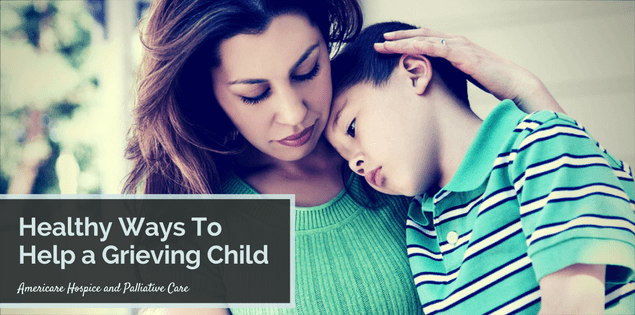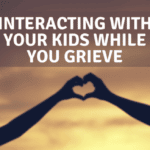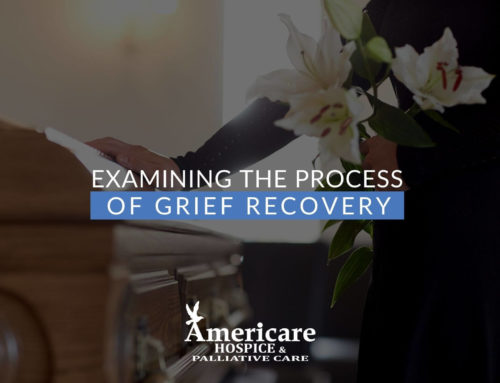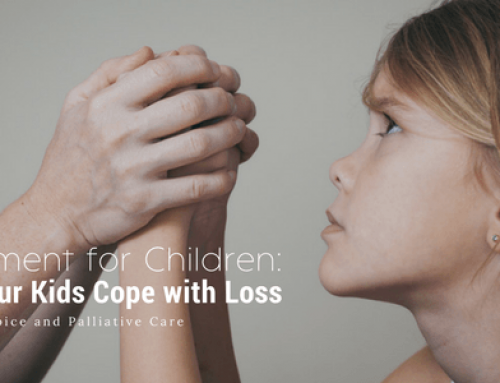Healthy Ways to Help a Grieving Child
Death isn’t easy for anyone to accept or to understand, let alone a child who may have limited understanding of even basic concepts about life. Trying to help a child understand death and cope with grief can be enormously difficult, especially if you are processing your own grief. You may be confronted with questions to which you don’t really have answers yourself, and you may have to help a child cope with feelings that you don’t know how to deal with yourself.

Help is available from counselors and spiritual advisors, and you can also sign your child up for a bereavement program or grief counseling for kids. But it’s also important that you learn some strategies to help yourself. Here are a few healthy ways that you can help a grieving child:
Answer All their Questions

When we avoid questions, kids don’t forget they have them. We do. We go on about our business, but kids continue to have the same questions, and they continue to struggle. Treat these questions seriously, and answer all of them – even the ones that are hard, and even the ones you don’t want to answer.
Don’t feel like you have to have a definite answer for every question. Saying “I don’t know” is a perfectly acceptable answer. But you must be honest, and you must be direct. Don’t lie to children, and don’t give them euphemisms. Don’t say that someone has “passed away;” say they “died.” Don’t say that someone is just “on vacation;” say they are gone forever. These answers can sound harsh in their simplicity, but it is more harsh for children to believe a lie and then find out the truth later.
You can discuss your spiritual beliefs if you have them, or you can share what others believe if you think it appropriate. But you should be consistent and direct.
Use Appropriate Language

A 4-year-old does not understand the inner workings of the heart and how things like high blood pressure or plaque can make it stop. However, he can understand that a heart or a body “stopped working.” You must use language that is appropriate to the child. If you aren’t sure what is appropriate, take your cues from the child. Answer in simple terms, and if the child asks more questions, then you provide more information.
Again, it is important to be honest and direct. Don’t hide behind clinical language or abstract concepts. Answer clearly.
Talk about the Person Who Died

Many adults shy away from talking about people who have died because it brings up painful memories. But avoiding those memories can make it harder to grieve and to process the loss. You can help children by talking about the person who died – especially if it is someone close like a parent or a sibling.
Sharing stories about the person who died or even just mentioning the person’s name can give children an opportunity to share their own memories or their feelings about their loss. Sharing feelings can help children process their loss, and sharing those memories is a way to help the person “live on” and lessen the impact of the loss even in a small way.
Provide Choices

Death can make children feel even more helpless in a world where they already have few choices and little control. Giving children choices gives them a small sense of control, and it helps them lead their own grieving process.
For example, you might ask your child if he wants to draw a card to say goodbye and place it in the coffin or next to the grave site. Or you might ask if he wants to create some other piece of art instead. Depending on the age of the child and the circumstances of the illness or death, some other choices might include whether to visit them at the Queen Creek hospice care facility in to say goodbye, whether to attend the funeral, or whether to create a memory book or other memorial. Weigh the circumstances and the age of your child, and try to provide as many choices as you can in the situation.
Listen and Validate Feelings
Children may not process things the way you would expect, and they may not look like they are grieving right away. Often, these feelings come out later, and they may not seem directly related to the loss. The best thing you can do to help children through their grief is to listen when they tell you things and to validate their feelings. In validating, you can also name their feelings, which can help them better understand what they are experiencing.
[lyte id=”qbTrx4H74-E” /]
Adults often want to say things like, “Everything will be fine” or “Don’t cry! You’ll be ok.” Instead, say things like, “It’s very sad, and you miss him very much,” or “I understand how hard it is. I cry sometimes, too.” In listening and validating, you let children know that you are there for support and that it is OK to feel whatever they are feeling.
Grief is hard for anyone, and it makes it harder when children are affected. Americare Hospice and Palliative Care in Arizona offers a bereavement program for all family members dealing with grief, as well as specific grief counseling for kids. Our counselors can provide spiritual and emotional support to help you and your children process your grief and come together as a family. We also provide hospice care in Queen Creek for loved ones who are at the end of their life, as well as support services for the whole family. Contact us in Arizona to learn more about our hospice care, bereavement program, or other services.
Published By:
1212 N. Spencer St., Suite #2
Mesa, Arizona 85203
Office: (480) 726-7773
Fax: (480) 726-7790
Email: info@americarehospice.org








